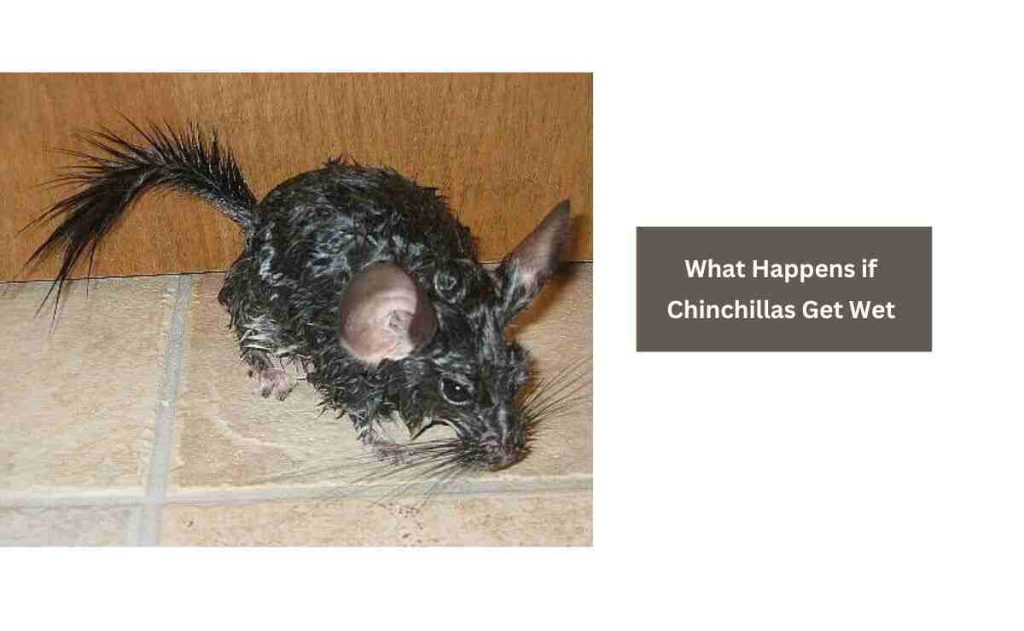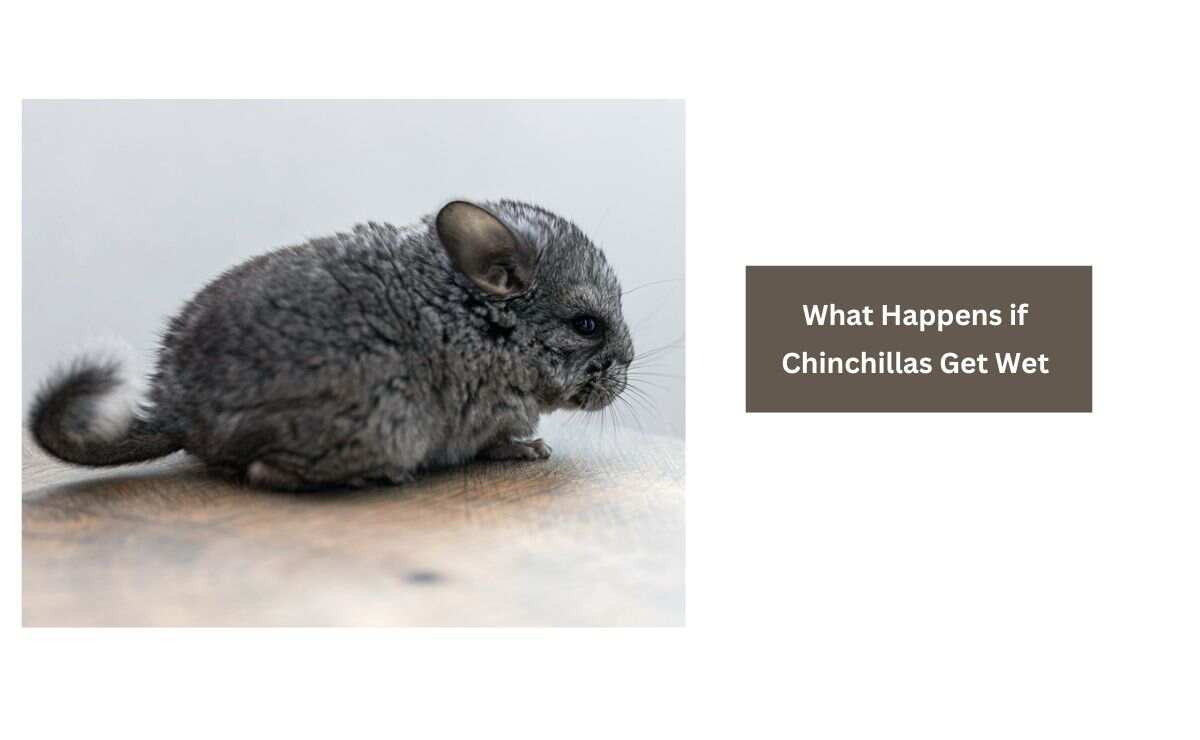Chinchillas, the adorable and charismatic rodents native to the Andes Mountains, are known for their luxurious fur and ability to thrive in dry climates. However, these small creatures have a unique vulnerability when it comes to moisture. Their dense coats provide exceptional insulation but can quickly become a detriment if they get wet.
In this article, we will explore what happens if chinchillas get wet and why it is crucial to protect them from damp environments. Understanding the consequences of water exposure on these delicate animals will help chinchilla owners ensure the optimal well-being of their furry companions.
So, let’s delve into the world of chinchillas and discover how moisture affects them!
What Happens if Chinchillas Get Wet?

If chinchillas get wet, it can be quite dangerous for them. Chinchillas have dense fur that is designed to keep them warm and dry in their natural habitat, the Andes Mountains of South America. Their fur is so thick that it takes a long time to dry, and if they remain wet for too long, it can lead to health problems.
When a chinchilla gets wet, its fur becomes matted and clumped together, which prevents air from reaching the skin. This can create a breeding ground for bacteria and fungi, leading to skin infections or even fungal diseases. Additionally, wet fur can cause chinchillas to become chilled, as their body temperature drops when their fur is wet. This can lead to respiratory issues or hypothermia if not addressed promptly.
To prevent these problems, it’s important to keep your chinchilla away from water sources and ensure they are kept in a dry environment. If your chinchilla does get wet accidentally or needs a bath due to specific circumstances (such as being soiled), you should use a specialized chinchilla-safe dust bath rather than water to clean them. Dust baths help remove excess oils from their fur without getting them wet and causing potential harm.
Can Chinchilla Shower With Water?
No, chinchillas should not be showered with water. Chinchillas have extremely dense fur that is designed to keep them warm in their natural habitat, the Andes Mountains of South America. Their fur is so dense that it can take a long time to dry if it gets wet, which can lead to skin problems and even hypothermia.
Instead of using water to clean themselves, chinchillas rely on dust baths. They roll around in special volcanic dust that helps absorb excess oils and moisture from their fur. This dust bath routine helps keep their fur clean and healthy without the need for water.
It’s important to provide your chinchilla with a suitable dust bath container filled with appropriate chinchilla dust. You can find these products at pet stores or online. Regular dust baths are essential for maintaining your chinchilla’s hygiene and overall well-being.
Why Can’t Chinchillas’ Fur Get Wet?
Chinchillas have a unique type of fur that is not designed to get wet. Their fur is extremely dense and plush, with each hair having multiple layers. This dense fur helps to insulate them in their natural habitat, which is the high-altitude Andes Mountains of South America.
When chinchilla fur gets wet, it takes a long time to dry due to its density. This can lead to skin problems such as fungal infections or dermatitis if the moisture remains trapped against the skin for too long. Additionally, wet fur can mat and tangle easily, causing discomfort and making it difficult for chinchillas to groom themselves properly.
Therefore, it is important to keep chinchillas away from water sources and ensure they are kept in a dry environment. Instead of bathing them with water, chinchillas take dust baths to keep their fur clean and healthy. The fine particles of special volcanic dust help absorb excess oils and moisture from their fur without damaging it.
How Does a Chinchilla Clean Itself?
Chinchillas are known for being very clean animals and have their own unique way of keeping themselves tidy. They have a dense fur coat that requires regular grooming to prevent matting and keep it in good condition. Chinchillas clean themselves by taking dust baths, which is an essential part of their grooming routine.
In the wild, chinchillas would roll around in volcanic ash to clean their fur. However, as pets, they are provided with special dust baths made from volcanic ash or other suitable materials. These dust baths are placed in their enclosure, and chinchillas instinctively know to roll around in them to remove dirt and excess oils from their fur.
During a dust bath, a chinchilla will vigorously roll around and flip its body, ensuring that every part of its coat gets covered with fine particles. The dust absorbs any moisture or oil on the fur, leaving it clean and fluffy. Afterward, they shake off any excess dust before returning to their normal activities. It’s important to provide your chinchilla with regular access to a dust bath to maintain its hygiene and overall health.
Why Do Chinchillas Love Dust?
Chinchillas love dust because it is essential for their grooming routine and overall health. Unlike most animals that clean themselves with water, chinchillas have dense fur that is prone to matting and retaining moisture. Dust helps them remove excess oils, dirt, and debris from their fur, keeping it clean and healthy.
Chinchillas have a specific type of dust bath that they use for grooming. This dust is made from fine volcanic ash or pumice, which has small particles that can penetrate their thick fur. When a chinchilla rolls around in the dust, it helps to absorb the oils and moisture in their fur, preventing any potential skin problems or infections.
Furthermore, dust baths provide mental stimulation for chinchillas. Rolling around in the dust mimics natural behaviors like burrowing and digging in their native habitat. It also gives them a sense of comfort and relaxation. So, while it may seem unusual to us humans, dust bathing is an integral part of a chinchilla’s daily routine and contributes to its overall well-being.
Conclusion
So, it is crucial to keep chinchillas dry and avoid exposing them to water as much as possible. Wet fur can lead to a variety of health issues for these delicate creatures, including fungal infections, respiratory problems, and hypothermia.
While chinchillas have some natural mechanisms to keep themselves dry, such as dust bathing, their ability to handle moisture is limited compared to other animals.
Therefore, it is important for chinchilla owners to provide a clean and dry environment for their pets and take necessary precautions when handling them near water sources. By being mindful of the potential risks associated with wetness, we can ensure the well-being and longevity of our beloved chinchillas.
Related Posts
